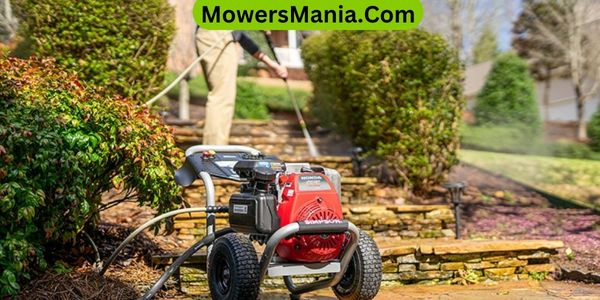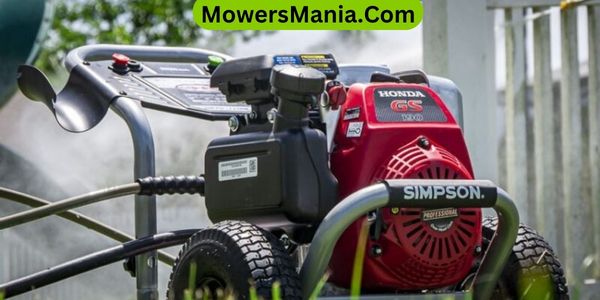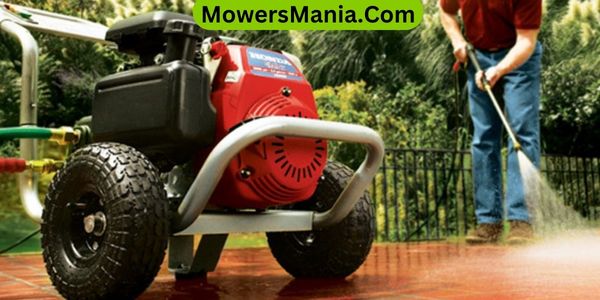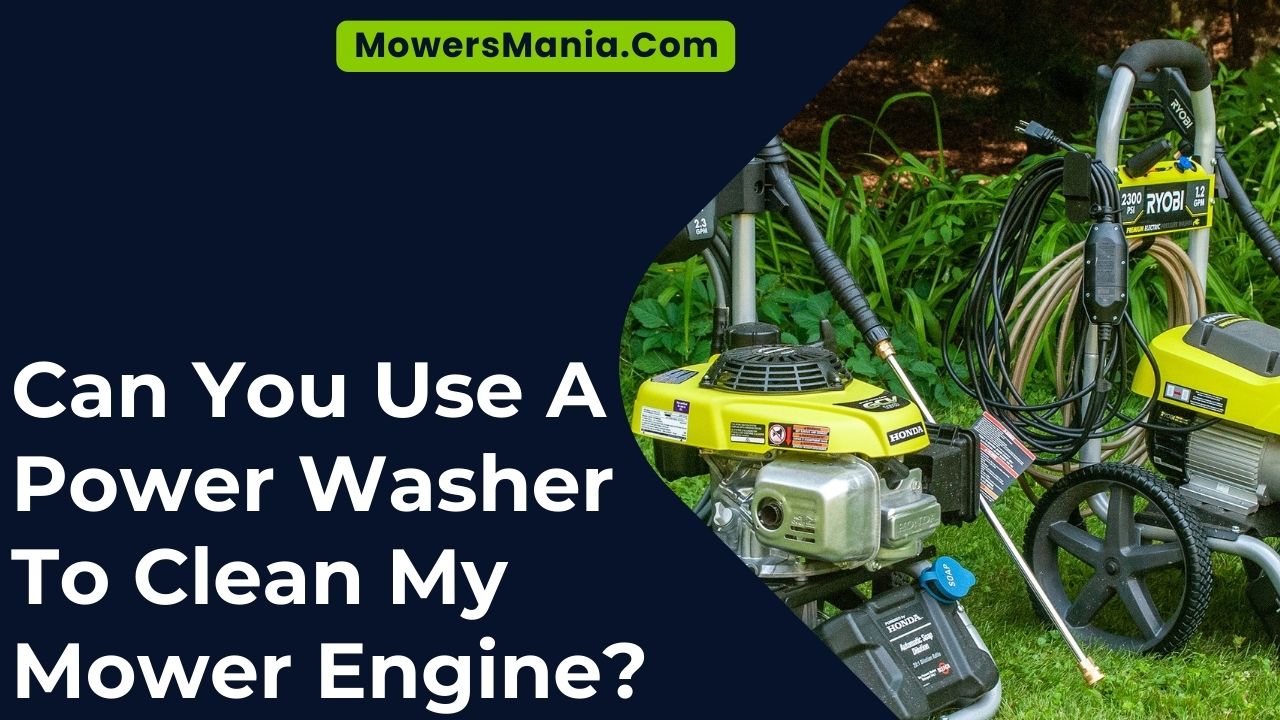Did you know that using a power washer to clean your mower engine is a common practice for many lawn care enthusiasts?
While it may seem like a quick and efficient way to remove built-up dirt and debris, there are important considerations to keep in mind before you fire up that power washer.
Before you rev up your engine, it’s crucial to understand the potential risks involved in using a power washer to clean your mower engine.

But don’t worry, we’ll explore the benefits and safety tips as well, so you can make an informed decision about the best way to keep your mower engine clean and running smoothly.
Potential Risks of Power Washing a Mower Engine
Power washing a mower engine can pose significant risks to its delicate components and electrical systems.
The high-pressure water can force its way into sensitive areas, such as the carburetor, air filter, and electrical connections, causing damage and potentially leading to costly repairs. Water intrusion can disrupt the electrical system, leading to malfunctions or even complete failure.
Additionally, the force of the water can dislodge or damage critical engine components, affecting the mower’s performance and longevity.
Furthermore, the intense pressure from the power washer can strip away paint and protective coatings, leaving the engine vulnerable to corrosion and rust.
In addition to the potential damage to the engine, power washing can also pose safety risks to the operator.
The high-pressure spray can cause injury if it comes into contact with the skin, eyes, or other body parts. Moreover, the use of water around a running engine introduces the risk of electrical shock.
Considering these potential risks, it’s crucial to explore safer alternatives for cleaning a mower engine. This includes using a gentle stream of water from a garden hose and employing specialized cleaning products and brushes for stubborn dirt and grease.
Benefits of Using a Power Washer
When cleaning a mower engine, a power washer can efficiently remove stubborn dirt and grease from hard-to-reach areas, saving you time and effort.
The high-pressure water stream can reach into nooks and crannies that are difficult to access by hand, ensuring a thorough cleaning without the need for excessive scrubbing.
This not only speeds up the cleaning process but also reduces the physical strain on your part. Additionally, a power washer can help in maintaining the overall performance of your mower engine by preventing the buildup of debris and grime, which can impact the engine’s functionality over time.
Moreover, the powerful stream of water can effectively remove grass clippings, oil splatters, and other residues that may accumulate on the engine, leading to a cleaner and more presentable appearance.
By using a power washer, you can achieve a level of cleanliness that might be challenging to attain with manual cleaning methods alone, ultimately prolonging the lifespan of your mower engine and ensuring optimal performance.
Safety Tips for Power Washing Your Mower Engine

To ensure a safe and effective cleaning process for your mower engine with a power washer, it’s important to prioritize your personal safety and minimize potential risks associated with high-pressure water cleaning.
Firstly, before starting, ensure that the engine is completely cool to avoid any risk of burns or other heat-related injuries. Additionally, disconnect the spark plug wire to prevent the engine from accidentally starting during the cleaning process.
When using the power washer, always wear protective gear such as safety goggles, gloves, and non-slip footwear to safeguard yourself from potential injuries. Be mindful of the water pressure and nozzle distance from the engine, as getting too close or using excessive pressure can cause damage to the engine components.
Furthermore, avoid spraying water directly into the engine’s air intake, exhaust opening, or any electrical components to prevent potential damage.
Lastly, be cautious of the surrounding area and any bystanders to ensure their safety as well. By following these safety tips, you can effectively clean your mower engine with a power washer while minimizing potential risks and ensuring a safe cleaning process.
Alternative Methods for Cleaning a Mower Engine
Consider utilizing a degreaser and a soft-bristled brush as an alternative method for cleaning your mower engine.
When using a degreaser, it’s essential to choose one specifically designed for engines to ensure it effectively breaks down grease and grime without causing any damage. Before applying the degreaser, make sure the engine is cool to the touch.
Spray the degreaser onto the engine, focusing on areas with heavy buildup, and allow it to sit for a few minutes to penetrate the grime.
Then, using a soft-bristled brush, gently scrub the engine to loosen the dirt and grease. Be careful around sensitive components and electrical parts to avoid causing any damage.
After scrubbing, rinse the engine with a gentle stream of water, being cautious not to directly spray sensitive parts such as the air filter, electrical components, or the carburetor.
It’s crucial to avoid using a high-pressure setting to prevent water from getting into areas where it could cause damage.
Once the engine is rinsed, allow it to air dry before starting the mower to ensure that all moisture has evaporated. This method can effectively clean your mower engine without the potential risks associated with using a power washer.
Maintenance Tips for Keeping Your Mower Engine Clean

To maintain a clean mower engine, regularly inspecting for grease and grime buildup in addition to utilizing alternative cleaning methods is essential for optimal performance.
Inspecting your mower engine regularly allows you to catch any buildup of grease, oil, or dirt before it becomes a major issue. Use a rag or a soft brush to gently wipe away any visible debris on the engine exterior.
Additionally, consider using a degreaser or engine cleaner specifically designed for small engines to remove stubborn buildup. When cleaning, be cautious of sensitive engine components and cover any areas that shouldn’t get wet.
Properly storing your mower is also crucial for keeping the engine clean. Store it in a dry, covered area to prevent dirt and debris from accumulating on the engine.
Lastly, following the manufacturer’s maintenance schedule for oil changes and filter replacements will help ensure that your engine stays clean and performs optimally.
By taking these simple maintenance steps, you can keep your mower engine clean and running smoothly for years to come.
Frequently Asked Questions [FAQs]
Can I Use a Power Washer to Clean Other Parts of My Mower, Such as the Blades or Undercarriage?
Yes, you can use a power washer to clean other parts of your mower, like the blades or undercarriage. Just be sure to use a wide-angle nozzle and keep a safe distance to avoid damaging the equipment.
What Type of Cleaning Solution Should I Use With a Power Washer on My Mower Engine?
When cleaning your mower engine with a power washer, use a gentle cleaning solution specifically designed for engines. Avoid harsh chemicals that could damage engine components. Always follow manufacturer guidelines for cleaning and maintenance to ensure proper care.
Can I Use a Power Washer on a Riding Mower as Well as a Push Mower?
Yes, you can use a power washer on both a riding mower and a push mower. Just be mindful of the pressure setting and keep the nozzle at a safe distance to avoid damaging the engine or other components.
Are There Specific Types of Power Washers That Are Better for Cleaning Mower Engines?
You can use a power washer to clean your mower engine, but be sure to choose a model with a lower PSI to avoid damaging delicate engine components. Always use a wide spray pattern and keep a safe distance from the engine.
Can I Use a Power Washer to Clean My Mower Engine if It Has an Electric Start or Other Electronic Components?
You can use a power washer to clean your mower engine, but be cautious around electric start and electronic components. Use a low-pressure setting and avoid spraying directly at these areas to prevent damage.
Conclusion
In conclusion, power washing can be an effective method for cleaning your mower engine. However, it also comes with potential risks such as damaging sensitive engine components.
It’s important to follow safety tips when power washing your mower engine. This includes using a low-pressure setting and keeping the nozzle at a safe distance from the engine.
Alternatively, you may want to consider using alternative cleaning methods to ensure the longevity of your mower engine. This could include manually cleaning the engine with a brush and a mild detergent or using compressed air to blow away dirt and debris.
Remember, regular maintenance and cleaning are essential for keeping your mower engine running smoothly for years to come. By taking proper care of your engine, you can avoid costly repairs and enjoy optimal performance from your mower.



